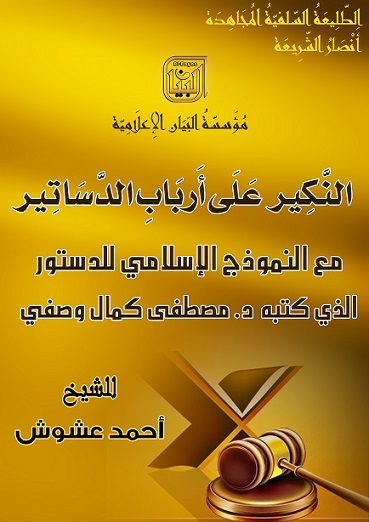Hello all. For the first time since the summer of 2011 this site will be going on a hiatus. Jihadology will return with new jihādī primary source materials in 2013. Similar to previous years, I have scheduled a series of posts related to books, academic journal articles, think tank/NGO/policy/governmental reports and articles of the year as well as books I’m looking forward to coming out in 2013. These scheduled posts will be running Monday through Friday over the next two weeks. For previous end of the year series see 2011 and 2010. Hope everyone has an enjoyable holiday and new year.
Year: 2012
al-Bayyān Media Foundation presents a new article from Anṣār al-Sharī'ah in Egypt's Shaykh Aḥmad 'Ashūsh: "Bearing Down on the Employers of the Constitutions With the Sample of the Islamic Constitution, Which Was Written By Dr. Muṣṭafā Kamāl Wasfī"

Click the following link for a safe PDF copy: Shaykh Aḥmad ‘Ashūsh — “Bearing Down on the Employers of the Constitutions With the Sample of the Islamic Constitution, Which Was Written By Dr. Muṣṭafā Kamāl Wasfī”
__________
To inquire about a translation for this article for a fee email: [email protected]
Mirkaz al-Maqrīzī al-Dirāsāt al-Tārīkhīyyah presents a new article from Shaykh Abū al-Mundhir al-Shinqīṭī: "Comment on the Fatwā of Shaykh Barāk About the Vote on the Constitution"

Click the following link for a safe PDF copy: Shaykh Abū al-Mundhir al-Shinqīṭī — “Comment on the Fatwā of Shaykh Barāk About the Vote on the Constitution”
_________
To inquire about a translation for this article for a fee email: [email protected]
Minbar at-Tawḥīd wa-l-Jihād presents two new Fatāwā from Shaykh Abū al-Mundhir al-Shinqīṭī

Click the following links for safe PDF copies:
Shaykh Abū al-Mundhir al-Shinqīṭī — Should One Remain With Ones Kids Or Do Hijrah in the Way of God?
Shaykh Abū al-Mundhir al-Shinqīṭī — Should One Take the Call of Jihād to ash-Shām If Completely Capable?
_________
To inquire about a translation for these Fatāwā for a fee email: [email protected]
al-Imārah Studio presents a new issue of the Islamic Emirate of Afghanistan’s magazine: “Sharī’at Issue #9″
NOTE: For previous issues see: #8, #7, #6, #5, #4, #3, #2 and #1.
—

Click the following link for a safe PDF copy: Islamic Emirate of Afghanistan — “Sharī’at Issue #9″
________
To inquire about a translation for this magazine issue for a fee email: [email protected]
New Fatwā from Dr. Iyād Qanībī: "Should We Vote on the Constitution?"
________
To inquire about a translation for this article for a fee email: [email protected]
Articles of the Week – 12/8-12/14
Saturday December 8:
Do Terrorist Attacks Increase Closer to Elections? – Lindsay Shorr Newman, Terrorism and Political Violence: https://bit.ly/SOWQwv
Religion, Government Coalitions, and Terrorism – Nil S. Satana, Molly Inman & Jóhanna Kristín Birnir, Terrorism and Political Violence: https://bit.ly/U52yYj
The Electoral Terrorist: Terror Groups and Democratic Participation – Robert Brathwaite, Terrorism and Political Violence: https://bit.ly/SOWRR0
Hamas as a Political Party: Democratization in the Palestinian Territories – Tavishi Bhasin & Maia Carter Hallward, Terrorism and Political Violence: https://bit.ly/U52HL6
Safety-Valve Elections and the Arab Spring: The Weakening (and Resurgence) of Morocco’s Islamist Opposition Party – Matt Buehler, Terrorism and Political Violence: https://bit.ly/SOWXIa
Tuesday December 11:
The potential for collaboration between Islamists & Western left-wing extremists: theoretical & empirical introduction – Gary A. Ackerman & Jeffrey M. Bale, Dynamics of Asymmetric Conflict: https://bit.ly/ST9ZVi
Language & Conflict: The Political History of Arabisation in Sudan & Algeria – Heather J. Sharkey, Studies in Ethnicity & Nationalism: https://bit.ly/VRhcYT
Rally ‘Round the Jihadist – Aaron Y. Zelin, Foreign Policy: https://bit.ly/VS9Moa
Thursday December 13:
The New Face of Al-Qaeda in Pakistan – Gohar Abbas, ISN: https://bit.ly/UVEUAN
Emergence of the Rhetoric of a Unified Ummah among American Muslims: The Case of Metropolitan Chicago – Paul D. Numrich, Journal of Muslim Minority Affairs: https://bit.ly/UVJ242
“European Islam” in Practice—in the Bosnian City of Sarajevo – Mieke van Dijk & Edien Bartels, Journal of Muslim Minority Affairs: https://bit.ly/UVJ4c2
Arabization and Its Discontents: The Rise of the Amazigh Movement in North Africa – Bruce Maddy-Weitzman, The Journal of the Middle East and Africa: https://bit.ly/UVJbEy
Why Did the US kill ‘Adnan al-Qadhi? – Gregory Johnsen, Waq al-Waq: https://bit.ly/W1dhIY
Friday December 14:
Debating the Islamic Shari’a in 21st Century Egypt – Nathan J. Brown, The Review of Faith & International Affairs: https://bit.ly/U00dBt
Shari’a in the Politics of Saudi Arabia – Frank E. Vogel, The Review of Faith & International Affairs: https://bit.ly/U00lRr
Ethical Not Shari’a Islam: Islamic Debates in Turkey – Hakan M. Yavuz, The Review of Faith & International Affairs: https://bit.ly/U00xAe
Shari’a in Afghanistan – Thomas J. Barfield, The Review of Faith & International Affairs: https://bit.ly/UrzOsX
Shari’a and the State in Pakistan – Muhammad Qasim Zaman, The Review of Faith & International Affairs: https://bit.ly/U00LaD
Shari’a Politics and Indonesian Democracy – Robert W. Hefner, The Review of Faith & International Affairs: https://bit.ly/U00V1H
Inside an Indonesian Online Library for Radical Materials – Muhammad Haniff Hassan and Zulkifli Mohamed, Perspectives on Terrorism: https://bit.ly/UrCpTF
New statement from Muḥammad al-Ẓawāhirī: "On the Constitution"
أولا :
نرفض الإستفتاء على الدستور المعروض حالياً
1 – لأن جعل السيادة للشعب – تكون له الكلمة العليا عن طريق الإستفتاء و الانتخابات في الأمور الشرعية – غير جائز
2 ــ حتى من ترخص في ذلك لإقامة الشريعة ، لا حجة له هنا ، حيث أن الدستور المعروض لا يطبق شرع الله
3 ــ نعترض على كل ما يخالف شرع الله في مسودة الدستور المعروضة مثل :
أ – جعل السيادة للشعب
ب – الديمقراطية و التي تعني حكم الشعب
ج – جعل التحليل و التحريم بموجب القانون الوضعي و ليس شرع الله
ء – جعل المساواة فيما فرق الشرع فيه و لم يجعله متساوياً
مثل المسلم و الكافر – و الرجل و المرأة – و الحر و العبد .
هـ – عدم الألتزام بأحكام الشريعة و تحريم ما أحل الله أو العكس .
ثانياً :
لا يعني ذلك أننا نوالي طوائف تعادي الإسلام أو نعادي تيارات إسلامية تسعى لتطبيق شرع الله بطرق سياسية طالما بقيت في حظيرة الإسلام و إن أرتكبت معاصي ، و لكن ولاءنا كله لدين الله و نوالي و نحب كل من له أصل الإسلام ، و له علينا حق النصرة و حقوق المسلم و إن إختلفنا معه في مسائل يجوز الخلاف فيها ، و لكن يبقى له أصل المحبة و النصرة و الموالاة و نكره معصيته ، و له علينا حق النصيحة ، و من هذا الباب نبين اعتراضنا.
_________
To inquire about a translation for this statement for a fee email: [email protected]
New article from Dr. Akram Ḥijāzī: "'Jabhat al-Nuṣrah' and the Terrorists"

Click the following link for a safe PDF copy: Dr. Akram Ḥijāzī — “‘Jabhat al-Nuṣrah’ and the Terrorists”
__________
To inquire about a translation for this article for a fee email: [email protected]
al-Manārah al-Bayḍā' Foundation for Media Production presents a new video message from Jabhat al-Nuṣrah: "Beginning of the End #3: Aleppo and The Battle of Glory"
NOTE: For earlier versions in this video series see: #2 and #1.
—

_________
To inquire about a translation for this video message for a fee email: [email protected]
